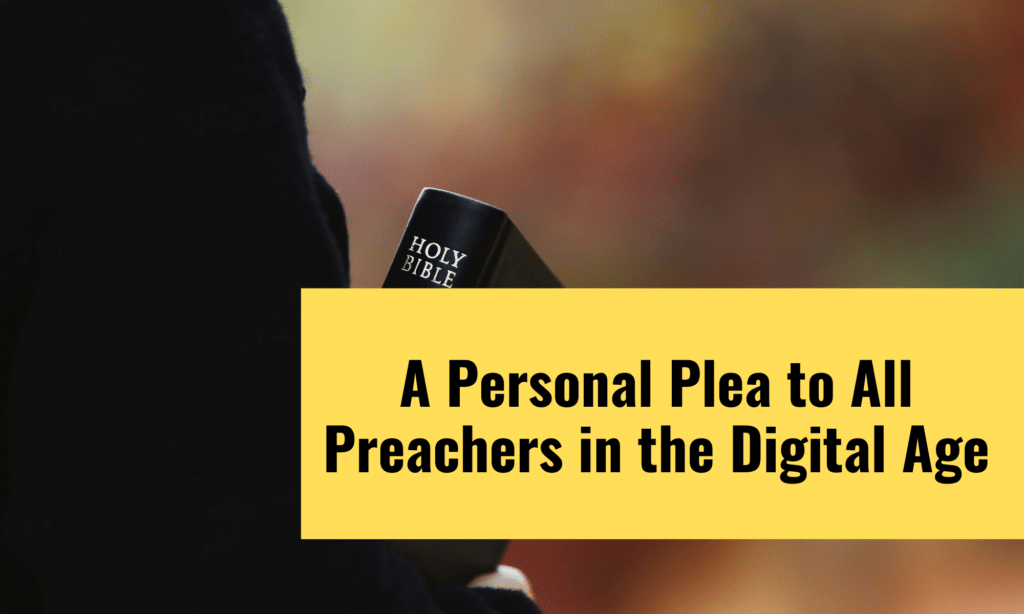When I was a kid growing up in the 90’s in Amarillo, TX, I distinctly remember a nearby preacher getting into a bit of controversy.
I don’t remember exactly what it was about, but I do remember there were quite a few people up in arms over it. There were several meetings between the elders about how they should respond.
Finally, they confronted the preacher as a group about the preaching he had done during a specific meeting. His response?
Prove it.
They tried, but there was one major problem: All the tapes from the meeting had been “conveniently” destroyed.
Without evidence, there was nothing but hearsay. Nobody could remember quite what had been said, and the preacher was pretty slippery in getting around it. Within months, he had moved on somewhere else and the matter was forgotten.
We don’t have that problem now.
If someone gets up in the pulpit of any church anywhere, in this day and age, that sermon is almost always recorded. Whether it’s live streamed automatically over the internet or recorded by a personal device and uploaded later, you’re almost sure to find a copy floating around somewhere.
In a lot of ways, that’s a good thing. If a sermon was particularly moving, it’s easy to find. Likewise, if a sermon is terrible, you can’t escape it (I’ve got several of those).
And if a sermon is controversial, it can be played and analyzed to everyone’s content.
The Responsibility of Preachers
The responsibility that teachers fill hasn’t changed. James 3:1 tells us that not many should become teachers because they will incur a stricter judgment. People trust those who get up in the pulpit — for better or for worse. It implies authority, and those who step behind it need to take that matter seriously.
That applies even more in the digital world. I’ve listened to sermons from preachers that I’ve never met simply because they existed on a website somewhere. I’ve read blogs from brethren all over the country and tuned in on livestream services from a different country.
I also know that people tune into our services and read our blogs. I’ve got the stats on our church website that tell me where people are coming from, what articles they’re reading, and what sermons they’re watching.
Because of that, my digital pulpit has expanded.
It used to be that I could preach a sermon, and if there was a misunderstanding, I could handle it before that person walked out the door.
Now, it may be weeks, months, or even years before someone has a complaint about one of my sermons. The same goes for preachers everywhere. Just because your immediate audience didn’t have an issue with your sermon doesn’t mean nobody ever will.
And unlike the age before the internet, those sermons and Bible classes and Zoom lessons will be around forever. That means we need to be ever more diligent in making sure that we are Biblical with what we say. If there’s a hint of heresy — even if it was a slight misstep that we should have been clearer about — people can and will find out.
Our Responsibility as Listeners
The same responsibility is true in reverse. As listeners, we have unfettered access to any sermon we want. Ever. Dating back years.
Honestly, one of the beauties of the internet is the ability to listen to sermons from decades past that faithful brethren have taken the time to upload. I may not have been around to listen to these people in person, but thankfully, now I have the opportunity to do so online.
I can abuse this privilege in so many ways.
I could take a point from a sermon out of context and share it on TikTok.
I could go on a podcast and beat a strawman to death.
I could snipe at others through Facebook comments.
The anonymity that the internet provides means that I have a virtual smokescreen to hide behind at will. I can say whatever I want and almost completely disappear.
But is that honest? Is it right of me to take a sermon that someone else has taken great pains to get as right as possible and tear it apart from my keyboard?
We may not realize it, but as listeners, we have a digital pulpit as well. All of our social media circles — friends, followers, likes, etc — they all listen to us, even if we’re not “influencers.”
Some of those people listen to everything you say because the algorithm puts it right at the top of their feed. That’s a responsibility you shouldn’t take lightly either.
We can all do better. The internet is the wild west right now — highly irregulated and prone to digital violence.
As Christians, we’re called to be more. We’re supposed to be the light and salt of the world around us, and yet if they see us tearing each other apart, won’t that reflect poorly on the God we serve?
Be light. Be salt. Be better.


